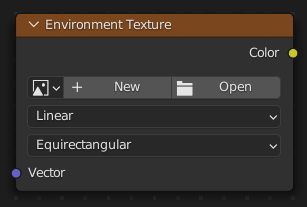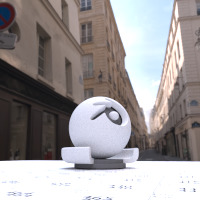Environment Texture Node¶

The Node Environmental Texture is used to light your scene using an environment map image file as a texture.
Inputs¶
- Vector
Texture coordinate for texture look-up. If this socket is left unconnected, the image is mapped as environment with the Z axis as up.
Propriedades¶
- Imagem
Image data-block used as the image source. Additional settings can be found in : These include options to control the alpha channel along with addition options for the color space. These addition options are documented with the rest of Common Image Settings.
- Color Space
Type of data that the image contains, either Color or Non-Color Data. For most color textures the default of Color should be used, but in case of e.g. a bump or alpha map, the pixel values should be interpreted as Non-Color Data, to avoid doing any unwanted color space conversions.
The list of color spaces depends on the active OCIO config. The default supported color spaces are described in detail here: Default OpenColorIO Configuration
- Texture Interpolation
Interpolation method used for the environment texture. The following interpolations are available:
- Linear:
Regular quality interpolation.
- Mais próximo:
No interpolation, use closest pixel.
- Cubic:
Smoother, better quality interpolation.
- Smart:
Bicubic when magnifying, otherwise Bilinear is used. This is only available for OSL.
- Projection Method
Allows you to use different types of environmental maps. The following methods are supported:
- Equirectangular:
Projection from an Equirectangular photo.
- Mirror Ball:
Projection from an orthographic photo or mirror ball.
Saídas¶
- Color
RGB color from the image.
Examples¶

HDR image from OpenFootage.net.¶